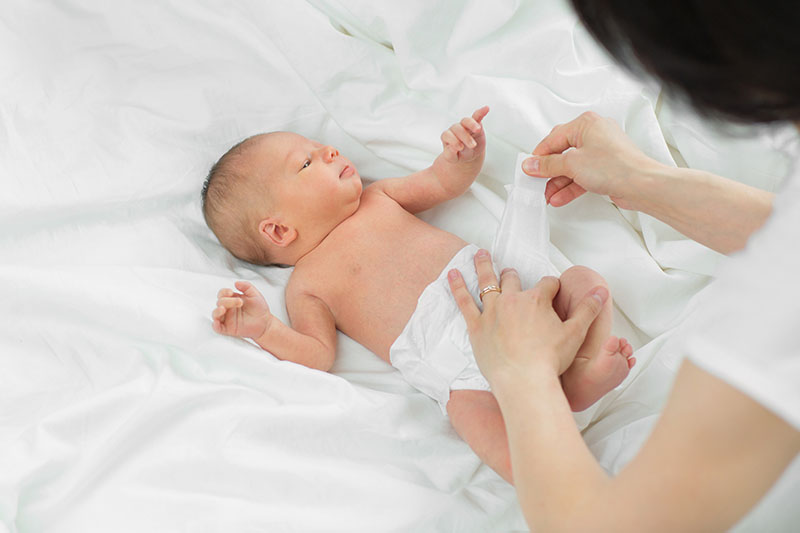Families For Life | Poos and Wees

Understanding and examining your baby’s poop and pee isn’t disgusting. It’s actually one of the best ways to easily and regularly check on your baby’s health.
Pee: What you need to know
Young babies can pee many times a day. Having lots of wet nappies is a good sign – it shows that your child is getting all the fluids she needs and is well hydrated. The wetting will happen less as your baby gets older, but it might still happen at least 6-8 times a day.
Every time your baby pees, look at the stream or colour of the pee stain on the nappy. This will tell you a lot about your baby’s health.
Light pink or orange stains are nothing to worry about. They’re caused by the pee reacting with chemicals in the nappy, and are quite common. Infrequent or darker pee, on the other hand, is a sign that your baby might be dehydrated or not feeding enough.
If the pee stains are red or brown, and you think there might be blood in the pee or your baby doesn’t seem well, see your General Practitioner (GP) or paediatrician immediately.
If your baby wears absorbent disposable nappies and you want to check how much he’s peeing, the weight of the nappy is a better test than how wet it feels. Also, sometimes there can be small ‘crystals’ on the inner surface of a disposable nappy. These come from the inside of the nappy, not from your baby.
Poop: What you need to know
Your newborn’s first poop will be a dark green, tar-like substance called meconium. This is normal – it’s your baby’s body emptying her stomach and bowel after being in the womb for nine months. You might see some dark green poop for a few days.
After this, there’s a big range of normal when it comes to what baby poop looks and smells like and how often babies poop.
Some babies might seem to poop all the time, and others might not poop as often. Pooping anywhere between three times a day and three times a week is normal.
Pooping is common during or shortly after feeding. This is called the gastro-colic reflex.
As the weeks pass, you can expect changes in:
frequency – that is, how often your baby poops
colour of the poop
consistency of the poop – firm, runny and everything in between
smell of the poop – it generally gets more smelly when baby starts eating solids.
The way your baby’s poop looks might depend on your baby’s diet.
Breastmilk
The poop:
will be quite soft and maybe even runny, a bit like mustard, often a yellow-orange colour, but sometimes green
will be less frequent but still quite soft after a few months
can smell quite sweet, and the smell can be affected by what you eat.
Formula
The poop:
is generally firmer but can vary a lot in colour and softness or hardness
can be grey-yellow (or even grey-blue), or some shades of brown.
Change from one formula to another
This can lead to changes in appearance and softness or hardness of baby’s poop.
Solids
The poop:
becomes firmer and smellier once you introduce solids
can look as if some solids are undigested. This is because your baby’s digestive system is still developing. It’s usually normal.
Pooping problems
Constipation
Constipation is when the poop is hard and dry, and looks like little marbles or pebbles. This kind of poop is difficult for your baby to push out, which can be upsetting for her. If this continues or you see any blood in the poop, speak with your GP or paediatrician.
Constipation is more likely to happen in bottle-fed babies. It usually happens when the formula has been made with too little water, but it can happen for other reasons too.
If your baby seems to be putting a lot of effort into pooping, it doesn’t necessarily mean she’s constipated. Young babies often go red-faced, grunt or even cry during pooping, but they usually grow out of this when they get more used to the experience. If your baby isn’t pooping very often but the poop is soft and easy to push out, it’s probably nothing to worry about.
However, if your baby is straining and producing hard, dry pebbles, it’s a good idea to see your GP or paediatrician, who can prescribe some short-term poop softeners.
Diarrhoea
Diarrhoea is when your baby has very runny or even watery stools, more often than usual. If your baby is vomiting as well, she might have a gut infection. In this situation, it’s important to see your GP or paediatrician immediately to make sure that your baby doesn’t get dehydrated.
Pale poop
If a baby with jaundice also has pale yellow, white or grey poop, see your GP or paediatrician immediately – this can be a sign of a rare liver disease. The baby will need a blood test to check. Take photos or even samples of your baby’s poo with you so the doctor can check it out.
© raisingchildren.net.au, translated and adapted with permission
Explore more